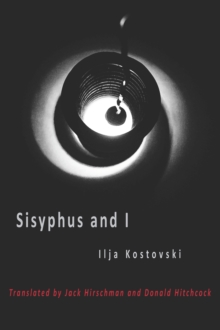A Glance into Ilja Kostovski's Selected PoetryIt is a slightly smirking smile that accompanies the voice calling on Muses in Ilja Kostovski's epic poetry and final book, Sisiphus and I.
In this seminal production of the poet's work, an eager, if slightly sarcastic, voice cries out from the woodpile of modernity:Don't tarry You envious GodThis minute I will go Into the deep forestsAnd will chop for you Firewood in piles.As for Kostovski's readers, they are the "connoisseurs of sorrow," the "suicide...leaning on the railings of bridges," the "self-despisers," for he is a poet of the lone wolves, the melancholy wanderer we read about in Blake and imagine among the happy crowds at Coney Island in the 1920s, or among the tripping multitudes of Haight Ashbury in the 1960s, or in the city where he made his last residence, the throngs of the upright and enraged of Washington, D.C.Kostovski's verse is prayer to a God who is or is not there, a nearly desperate, repeating "Come unto me." It is not merely exhortation to the deity.
He invokes, too, the gathering crowds of the lost and broken-hearted, as though the divine could only be conjured by those numbers, or as if the dead God of Nietzsche could be resurrected by a hoard whose suffering is the very thing that binds them.
In that case, instead of a savior, the hero of these poems is a common wound: "Come unto me those/Who have turned your roads/Into hazardous games." The language is straight out of the book of Micah (whose own anaphoric language begins each chapter with "Hear"), an Old Testament prophet no one believes, but the language pops with contemporary hideousness: "Come, candidates for oval offices/ Come, candidates for electric chairs." In what is perhaps the most powerful poem in the collection, "Sermon at the Washington Monument," Kostovski the poet recalls his association with Ferlinghetti, who "Told me once/The Anglo-Saxons speak the truth/with half-closed mouths..." From a formal angle, the collection Sisyphus and I is Kostovski's open-mouthed song to a universe that may or may not be listening.
Like the fledgling with mouth turned upward, Kostovski's poetry is both artistic hallelujah and hungry yawp, whose overarching tone is a kind of "gallows praise": "I hear America is not singing anymore/All songs are dead/And you are the executioner.../Have you ever known Francois Villion/ Who multiplied his life on the gallows?" The poet calls on writers to awaken—rather like Micah, standing on his street corner—if not to save anything, then to attend it as it passes, flares out, at the height of its beauty.
Kostovski, born in the Macedonian province of Greece, is the author of Dostoevsky and Goethe: Two Devils, Two Geniuses.
Like his poetry, his scholarship sought out the insight of the outsider, as he himself carried the burden of his generation through exile during Communist overthrows, until he settled in Washington, D.C.
The prophetic insight is this: a monument does not memorialize a country, but rather a misinterpreted ideal. The best remembrances are those that serve a human purpose. And the best invitation to the gods, in Kostovski's reckoning at least, is to chop some firewood, good for burning. This is a poet whose voice at once harkens back to the Tanakh while it recalls the beatniks of San Francisco, the homeless, and the insidious white power structures and silent mausoleums of Washington D.C.
We are reminded in these pages that life is to be sung open-mouthed, if at all. David KeplingerDecember, 2017.


